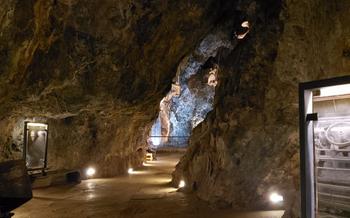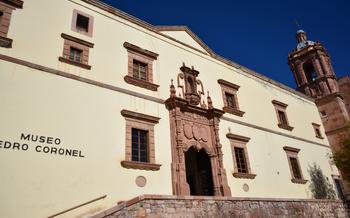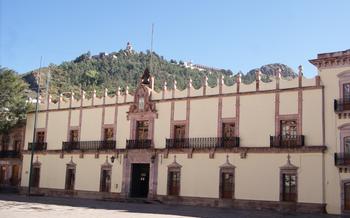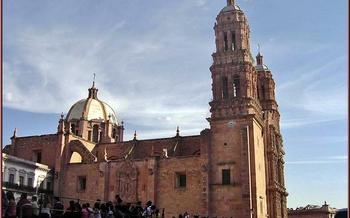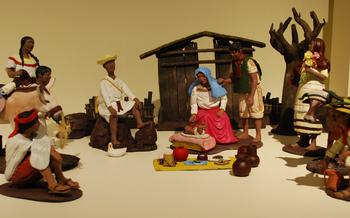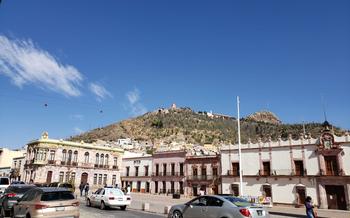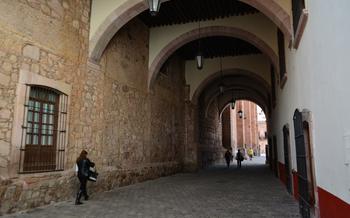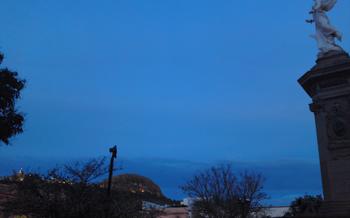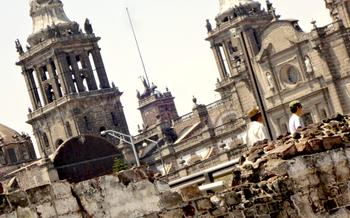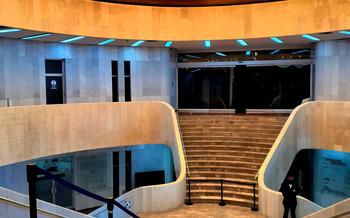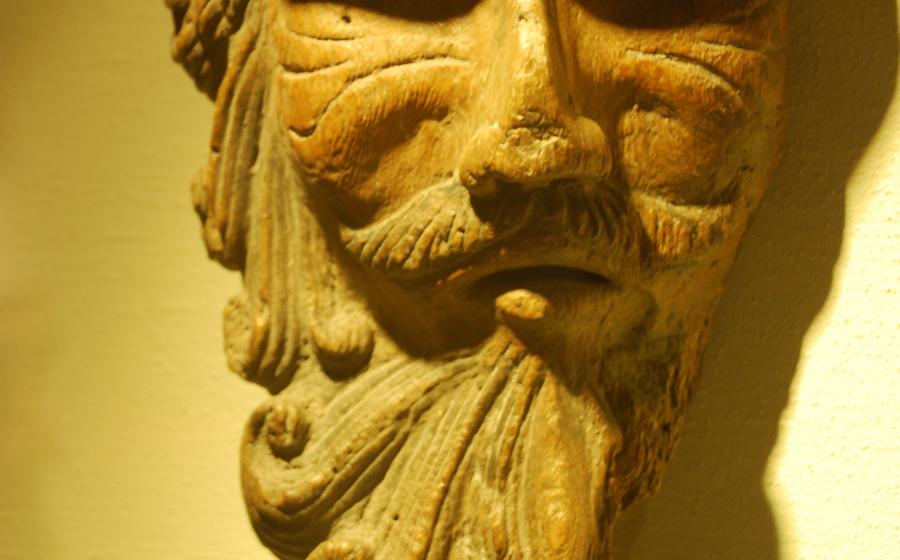
Museo Rafael Coronel (Museum of Masks)
- Museo Rafael Coronel: A Haven of Folk Art and Cultural Treasures
- Exploring the Museum's Diverse Mask Collection
- Unveiling the Artistic Genius of Rafael Coronel
- Navigating the Museum's Exhibits and Galleries
- Immerse in the Vibrant Culture of Zacatecas
- Delving into the History of Masks in Mexico
- Experiencing the Creative Process: Mask-Making Workshops
- Symbolism and Meanings Behind the Masks
- Masks in Traditional Mexican Celebrations
- The Museum's Contribution to Cultural Preservation
- Rafael Coronel's Artistic Legacy
- Practical Tips for Visiting the Museum
- Souvenirs and Local Crafts
- Photography and Social Media
- Insider Tip: Hidden Gems of the Museum
Museo Rafael Coronel: A Haven of Folk Art and Cultural Treasures
In the heart of Zacatecas, Mexico, lies a remarkable museum that celebrates the rich tapestry of Mexican folk art and cultural heritage: the Museo Rafael Coronel. Founded by the renowned artist Rafael Coronel, this institution is a treasure trove of captivating exhibits, showcasing an impressive collection of masks, paintings, sculptures, and other artifacts that offer a profound insight into the soul of Mexico.
Historical Significance: The Museo Rafael Coronel was established in 1983, driven by the passion and dedication of Rafael Coronel, a prominent Mexican artist who dedicated his life to preserving and promoting Mexican folk art. Coronel's vision was to create a space where visitors could appreciate and learn about the diverse artistic expressions of Mexico's many regions and ethnic groups.
Overview of the Collection: The museum's collection is a testament to Coronel's discerning eye and deep appreciation for Mexican folk art. The centerpiece of the collection is an extraordinary array of masks, representing various regions and traditions across Mexico. These masks, intricately crafted and adorned with vibrant colors and symbols, offer a glimpse into the country's rich cultural heritage and the enduring significance of masks in Mexican society.
Architectural Features: The museum's architectural design is a harmonious blend of colonial and contemporary elements. Housed in a beautifully restored 18th-century building, the museum features spacious galleries, courtyards, and gardens that complement the exhibits and create a serene ambiance for visitors to explore and reflect.
Practical Information: The Museo Rafael Coronel is located in the historic center of Zacatecas, a UNESCO World Heritage Site. It is open to the public from Tuesday to Sunday, with varying hours of operation. Admission fees are minimal, and guided tours are available for a more in-depth exploration of the collection.
Exploring the Museum's Diverse Mask Collection
Masks have long held a significant place in Mexican culture, embodying deep-rooted traditions and beliefs. The Museo Rafael Coronel showcases a stunning array of masks, each representing a different region or ethnic group within Mexico. Visitors can marvel at the intricate designs and vibrant colors that adorn these masks, which range from traditional ceremonial masks to whimsical and contemporary creations.
The museum's collection offers a glimpse into the symbolism and meanings behind the masks, revealing the stories and legends that they represent. From masks depicting deities and spirits to those representing animals and human emotions, each mask tells a unique tale. Visitors can learn about the cultural and religious significance of masks in Mexican society and gain a deeper understanding of the rich traditions that surround them.
The museum also highlights the role of masks in traditional Mexican festivals and performances. Whether it's the Day of the Dead, Carnival, or regional celebrations, masks play an integral part in these vibrant events. Visitors can discover how masks are used in dances, rituals, and performances, showcasing the diverse ways in which they bring Mexican culture to life.
Unveiling the Artistic Genius of Rafael Coronel
Rafael Coronel, the visionary artist behind the Museo Rafael Coronel, was a renowned Mexican painter, sculptor, and printmaker. Born in Zacatecas in 1931, Coronel's artistic journey began at an early age, inspired by his father, a talented painter himself. Throughout his career, Coronel delved into various artistic mediums, expressing his unique style and perspective.
Coronel's artistic style was characterized by its surrealist and expressionist elements. His paintings often depicted haunting and dreamlike scenes, exploring themes of isolation, identity, and the human condition. His use of vibrant colors and bold brushstrokes created a sense of dynamism and emotional intensity.
In addition to his paintings, Coronel was also known for his sculptures and drawings. His sculptures, often crafted from bronze or clay, portrayed elongated and distorted figures, reflecting his fascination with the human form. His drawings, executed with precision and detail, revealed his mastery of line and composition.
Coronel's artistic influences were diverse, ranging from Mexican folk art to European masters such as Picasso and Goya. He skillfully blended these influences to create a unique artistic language that was both deeply rooted in Mexican culture and open to international trends.
Coronel's contributions to Mexican art were widely recognized, earning him numerous awards and accolades. His works have been exhibited in prestigious galleries and museums worldwide, solidifying his position as one of Mexico's most celebrated artists. Through the Museo Rafael Coronel, his legacy continues to inspire and captivate visitors, offering a glimpse into the mind and artistry of this extraordinary creator.
Navigating the Museum's Exhibits and Galleries
The Museo Rafael Coronel is a treasure trove of Mexican folk art and cultural artifacts, organized into various exhibition spaces and galleries to showcase the diverse collection effectively. Visitors can embark on a journey through different sections, each highlighting specific aspects of Mexican folk art and the artistic genius of Rafael Coronel.
One of the main highlights of the museum is the Mask Gallery, which houses an impressive collection of masks from various regions and ethnic groups across Mexico. The masks are categorized based on their origin, allowing visitors to explore the diverse cultural expressions of different communities. Each mask is a masterpiece, intricately crafted and adorned with unique designs, colors, and materials.
Another notable section of the museum is the Rafael Coronel Gallery, which showcases the artist's prolific body of work. Here, visitors can admire Coronel's paintings, sculptures, drawings, and other creations that demonstrate his unique style and artistic vision. The gallery provides insights into the artist's creative process and the influences that shaped his artistic journey.
The museum also features thematic sections dedicated to Mexican Folk Art. These sections showcase a variety of traditional crafts, such as pottery, textiles, wood carvings, and metalwork. Visitors can learn about the techniques and materials used by artisans, as well as the cultural significance of these art forms.
To enhance the museum experience, interactive displays and educational programs are offered for visitors of all ages. These programs include guided tours, workshops, and hands-on activities that provide a deeper understanding of Mexican folk art and the museum's collection.
Immerse in the Vibrant Culture of Zacatecas
The Museo Rafael Coronel is not merely a repository of artifacts; it is a gateway to experiencing the vibrant culture of Zacatecas. The city boasts a rich tapestry of traditions, festivals, and events that showcase its unique character. Visitors can immerse themselves in the local culture by attending one of the many festivals held throughout the year. The Zacatecas Cultural Festival, for instance, is a grand celebration of the arts, featuring performances, exhibitions, and workshops. The Festival of Saint Anthony, on the other hand, is a religious and cultural extravaganza that honors the city's patron saint. For those seeking a more immersive experience, the Museo Pedro Coronel offers workshops on traditional crafts such as pottery, weaving, and mask-making, providing a hands-on opportunity to learn from local artisans and create their own unique souvenirs.
Delving into the History of Masks in Mexico
The tradition of mask-making in Mexico has ancient roots, dating back to pre-Columbian civilizations. Masks held significant cultural, religious, and ceremonial importance in these societies. They were often used in rituals, ceremonies, and daily life to represent deities, spirits, animals, and human emotions. The designs and symbolism of these masks varied greatly among different regions and ethnic groups, reflecting the diverse cultural heritage of Mexico.
Over time, mask-making evolved under the influence of European and contemporary art movements. During the colonial period, masks were used in religious processions and celebrations, often depicting biblical characters or saints. In the 20th century, Mexican artists such as Diego Rivera and Frida Kahlo incorporated masks into their artwork, drawing inspiration from both pre-Columbian and folk traditions.
Today, the tradition of mask-making continues to thrive in Mexico, with artisans creating masks for various purposes, including traditional festivals, performances, and as decorative objects. The Museo Rafael Coronel in Zacatecas plays a crucial role in preserving and showcasing this rich cultural heritage through its extensive collection of masks from different regions of the country.
Experiencing the Creative Process: Mask-Making Workshops
The Museo Rafael Coronel offers a unique opportunity for visitors to delve into the creative process of mask-making through hands-on workshops and classes. Under the guidance of experienced local artisans, participants can learn the traditional techniques and skills involved in crafting a Mexican mask.
The workshops typically begin with a brief introduction to the history and significance of masks in Mexican culture. Participants then have the chance to choose from a variety of mask designs, each representing a different region or ethnic group of Mexico. With the guidance of the instructors, they select the appropriate materials and begin the process of creating their own unique mask.
Using traditional tools and techniques, participants learn how to shape, carve, and decorate their masks. They explore the use of natural materials such as wood, leather, and feathers, as well as paints and other embellishments. The instructors provide guidance on how to create intricate designs and patterns, often inspired by ancient Mexican symbols and motifs.
As they work, participants gain insights into the symbolism and meanings behind different mask designs. They learn about the cultural, religious, and mythological significance of masks, and how they are used in traditional Mexican rituals, festivals, and performances.
The mask-making workshops offer a truly immersive experience, allowing visitors to connect with Mexican folk art and traditions in a meaningful way. The opportunity to create their own unique souvenir makes the experience even more memorable, and participants leave the museum with a deeper appreciation for the artistry and craftsmanship that goes into Mexican mask-making.
Symbolism and Meanings Behind the Masks
Beyond their aesthetic beauty, the masks in the Museo Rafael Coronel hold profound cultural, religious, and mythological significance. Each design carries a unique symbolism and meaning, reflecting the deep-rooted beliefs and traditions of Mexico. Some masks represent deities, such as the feathered serpent god Quetzalcoatl, while others embody spirits of nature, animals, or human emotions. The intricate designs and colors often convey stories and legends associated with specific masks, offering a glimpse into the rich tapestry of Mexican folklore. Understanding the symbolism behind these masks allows visitors to delve deeper into the cultural heritage and traditions that have shaped Mexico's identity.
Masks in Traditional Mexican Celebrations
Masks play an integral role in various traditional Mexican festivals and celebrations, adding a vibrant and symbolic dimension to these events. One of the most notable celebrations where masks take center stage is the Day of the Dead, or Día de los Muertos. During this annual festival, people honor and remember their deceased loved ones by creating elaborate altars adorned with marigolds, candles, and offerings. Masks are often used to represent the spirits of the departed, blurring the lines between the living and the dead.
Another significant event where masks are prevalent is Carnival, a pre-Lenten celebration marked by colorful parades, music, and dancing. In many regions of Mexico, people wear intricate masks to disguise their identities and engage in playful mischief. These masks often feature exaggerated expressions, animal motifs, or satirical caricatures, reflecting the festive and humorous spirit of Carnival.
Beyond these major celebrations, masks are also incorporated into regional festivals and rituals throughout Mexico. In the state of Guerrero, for instance, the Dance of the Tecuanes features dancers wearing jaguar masks, representing the struggle between good and evil. In the Yucatán Peninsula, the Hanal Pixán festival involves the use of masks to honor and communicate with the souls of the deceased.
The use of masks in traditional Mexican celebrations serves to connect people with their cultural heritage, reinforce community bonds, and express their creativity and spirituality. These masks are not mere decorative objects but powerful symbols that embody the essence of Mexican traditions and beliefs.
The Museum's Contribution to Cultural Preservation
The Museo Rafael Coronel stands as a bastion of cultural preservation, tirelessly documenting, safeguarding, and promoting the rich tapestry of Mexican folk art. Collaborating closely with local artisans and communities, the museum plays a pivotal role in ensuring that traditional techniques and practices do not fade into oblivion. Through educational initiatives, exhibitions, and workshops, the museum raises awareness about the significance of Mexican cultural heritage and instills a deep appreciation for its diverse expressions. Moreover, the museum serves as a repository of knowledge and inspiration, providing a platform for future generations to explore, learn from, and perpetuate the vibrant traditions that define Mexico's cultural identity.
Rafael Coronel's Artistic Legacy
Rafael Coronel's artistic contributions have earned him widespread recognition and accolades throughout his career. His unique style and masterful techniques have left an indelible mark on the Mexican art scene and beyond. Coronel's artwork has been celebrated for its depth, emotional intensity, and ability to capture the essence of Mexican culture.
His influence on contemporary Mexican artists has been profound, inspiring a new generation to explore and embrace their cultural heritage. Coronel's legacy extends beyond his individual works, as he also played a pivotal role in promoting and preserving Mexican folk art. Through his tireless efforts, he helped elevate the status of traditional crafts and indigenous art forms, bringing them to the forefront of the contemporary art world.
The Museo Rafael Coronel stands as a testament to the artist's vision and dedication. It houses a significant portion of his extensive body of work, including paintings, sculptures, drawings, and, of course, masks. The museum serves as a repository of his artistic legacy, ensuring that his contributions continue to inspire and captivate audiences for generations to come.
Practical Tips for Visiting the Museum
To fully appreciate the treasures of the Museo Rafael Coronel, plan your visit during its operating hours, typically from Tuesday to Sunday, with varying hours depending on the season. Allocate at least two hours to explore the museum's diverse exhibits at a leisurely pace.
Take advantage of the guided tours offered in Spanish and English, which provide insightful commentary on the museum's collection. For a more personalized experience, consider booking a private tour. Additionally, audio guides are available for rent, allowing you to delve deeper into the stories behind the masks and artworks at your own pace.
The museum offers accessibility features to ensure that all visitors can enjoy the exhibits. Wheelchair ramps and elevators provide easy access throughout the museum, and tactile exhibits are available for visually impaired visitors.
Capture the beauty of the museum through photography, but be mindful of the museum's policy regarding flash photography and tripods. Share your experiences on social media using the museum's official hashtags to connect with other visitors and promote the museum's collection.
Remember to respect the museum's guidelines and regulations to ensure a safe and enjoyable visit for all.
Souvenirs and Local Crafts
The Museo Rafael Coronel offers a unique opportunity to purchase authentic Mexican souvenirs and handicrafts inspired by the museum's collection. The museum shop is a treasure trove of locally crafted items, ranging from intricate masks and pottery to colorful textiles and jewelry. Each piece is carefully selected to represent the rich cultural heritage of Zacatecas and Mexico as a whole.
By purchasing souvenirs from the museum shop, visitors not only take home a piece of Mexican folk art but also support local artisans and their livelihoods. The museum collaborates closely with local communities to ensure that the products sold are authentic and ethically sourced.
Exploring the nearby markets and artisan workshops in Zacatecas is another excellent way to discover unique souvenirs. Visitors can find handmade crafts, such as woven baskets, leather goods, and traditional Mexican toys, directly from the artisans who create them. These markets offer a vibrant glimpse into the local culture and provide an opportunity to interact with the talented craftspeople who keep traditional techniques alive.
Whether you choose to shop at the museum store or venture out into the city's markets, purchasing souvenirs from Zacatecas is a meaningful way to support local artisans, preserve Mexican cultural heritage, and create lasting memories of your visit to this vibrant and culturally rich destination.
Photography and Social Media
The Museo Rafael Coronel encourages visitors to capture and share their experiences through photography and social media. Photography is allowed in most areas of the museum, but visitors are kindly requested to be respectful of other visitors and avoid using flash or tripods. The museum's stunning collection provides ample opportunities for creative photography, allowing visitors to immortalize their visit and share the beauty of Mexican folk art with the world.
When sharing photos on social media, visitors are encouraged to tag the museum using @MuseoRafaelCoronel and use relevant hashtags such as #MuseoRafaelCoronel, #Zacatecas, and #MexicanFolkArt. By doing so, they contribute to promoting the museum's collection and raising awareness about the rich cultural heritage of Mexico. The museum's social media channels are a vibrant platform where visitors can connect with fellow art enthusiasts, share their experiences, and discover even more about the fascinating world of Mexican masks and folk art.
Insider Tip: Hidden Gems of the Museum
Beyond the main exhibition halls, the Museo Rafael Coronel holds hidden gems waiting to be discovered by curious visitors. Take a moment to explore the museum's charming courtyard, where you'll find a serene oasis adorned with sculptures and plants. This tranquil space offers a respite from the bustling city and invites contemplation.
Venture into the museum's gardens, where you'll encounter unexpected artistic installations and sculptures nestled amidst lush greenery. These outdoor spaces provide a unique perspective on Mexican folk art, blending nature and creativity in harmony.
Engage with the museum's friendly staff or knowledgeable guides. They can share insider knowledge about the collection, point out hidden details in the exhibits, and recommend lesser-known artworks that may have escaped your attention. Ask them about the stories behind specific masks or artifacts—they may reveal fascinating tales that bring the collection to life.
By exploring the hidden gems of the Museo Rafael Coronel, you'll gain a deeper appreciation for the richness and diversity of Mexican folk art. These hidden treasures offer a glimpse into the soul of Mexican culture, waiting to be uncovered by those who venture beyond the surface.
